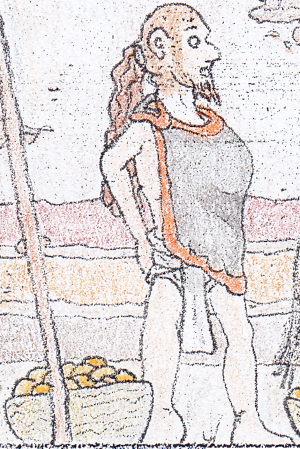Ebþúkans
Ebþúkic: Ebþúkat
Dalran: Ebþúkere
Húlpakric: Ebþúkö
The ebþúkans1 are the most prominent of many different ethnic groups inhabiting Balra, the western county (jú) of Vakúlstó, the eastern quarter (stó) of the empire of Dalra. Their traditional territory includes the city of Abarúnaxa and its surrounding area in the northwestern part of the county.
Though now part of Dalra, only the ebþúkan elite has adopted dalran culture some extend, while the common people hold fast to their ancient traditions and beliefs.
Hairstyles vary greatly among ebþúkans, some prefer long hair and beards as dalrans and húlpakrans do, while more traditional styles are common, where most of the head is shaven and beards are kept short.
The ebþúkans1 are the most prominent of many different ethnic groups inhabiting Balra, the western county (jú) of Vakúlstó, the eastern quarter (stó) of the empire of Dalra. Their traditional territory includes the city of Abarúnaxa and its surrounding area in the northwestern part of the county.
History
Before the dalrans, the ebþúkans ruled their own kingdom up in the eastern Zamra Mountains foothills, which despite its relatively small size was able to support a large population thanks to their advanced irrigation system. They often warred with the Vanrans of the southwestern mountains and eventually aided the Dalrans and other vanran subjects in their revolts against the latter.Though now part of Dalra, only the ebþúkan elite has adopted dalran culture some extend, while the common people hold fast to their ancient traditions and beliefs.
Culture
Apparel
Ebþúkan clothing is heavily influenced by the Húlpakrans, whom they traded with extensively back in the day; men often wear little more than a cloak and loincloth, while women wear a skirt and either a cloak (fastened differently than men do) or poncho. Nobles traditionally tattoo their faces and wear elaborate anklets as well.Hairstyles vary greatly among ebþúkans, some prefer long hair and beards as dalrans and húlpakrans do, while more traditional styles are common, where most of the head is shaven and beards are kept short.
Art
Architecture
Ebþúkan monumental architecture is notable for extensive use of black and white stone (in stark contrast with colourful dalran structures), circular plazas and rock-cut tombs.Cuisine
Traditional ebþúkan cuisine consists mainly of potatoes, apricots and other fruits, donkey meat- and milk, beef and wine. They were among the first people in Emlas to cultivate grapes, and their wine is popular throughout the empire.Language
Main article: Ebþúkic.Religion
The ebþúkan pantheon includes native deites as well as some adopted from neighboring cultures. Notable deities include Lanhal, their patron god of war and prophecy, the rain goddess Ókó and her husband Tedek, god of thunderstorms. A notable feature of most ebþúkan deities is that they're usually depicted as winged beings.1Original icelandic: Ebþúkar, singular: Ebþúki.







Comments